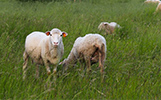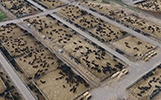| China has struggled with pollution in many industries; it’s encouraging to hear that the need for change has also been felt by the cattle industry, there is a lot of work to be done there.
Across China: Cattle Farms Along Yangtze Renovated to Reduce Pollution
Xinhuanet | May 27, 2018
The county of Fengdu in southwest China's Chongqing Municipality is overhauling its cattle farms to cut pollution along the Yangtze River.
The county famous for beef has over 1,000 cattle farms, the largest with over 10,000 head. One of the country's largest beef producer Hondo Beef is headquartered in Fengdu. There are more than 210,000 cattle in the county, according to the county animal husbandry bureau.
"About four years ago, pollution from cow dung was alarming, and we had to take action," said He Chuandong, deputy director of the bureau.
The Role Of Innovation In Europe's Animal Health 
EURACTIV | May 27, 2018
In an effort to minimise outbreaks of animal diseases, the European Commission adopted in 2007 the "Prevention is better than cure" approach when it comes to animal health strategy. According to the executive, the objective was to focus on preventive measures, disease surveillance, controls and research.
Since then, several policy initiatives have been put forward, such as the Animal Health Law in 2016, based on the principle that "healthy animals mean healthy people".
How important is the vaccination for animals? How could innovation in animal health lead to sustainable livestock? What is the role of EU farmers in promoting a responsible use of antibiotics in livestock? How could new technologies in agriculture help improve animal health surveillance systems?
New Zealand Orders Cattle Cull to Tackle Disease Outbreak
Dairy Global | May 29, 2018
A major cull of cattle has been announced in New Zealand by the government in a bid to eradicate the dreaded Mycoplasma bovis (M. bovis ) disease which has been spreading throughout the country. Around 126,000 cattle will be culled over the next 2 years, on top of the 26,000 cattle already being culled, as part of the wider eradication programme costing NZ$ 886 million (€ 526million, £462million, US$615million) over 10 years.
It interested me that this suddenly became a news article. In fact the feedlots they are referring to are not particularly large by international standards, and fed cattle have always been an essential part of the UK industry, both in terms of smoothing supply and in buffering grain supplies.
Revealed: Industrial–Scale Beef Farming Comes to the UK 
Andrew Wasley, Heather Kroeker, The Guardian | May 29, 2018
Thousands of British cattle reared for supermarket beef are being fattened in industrial–scale units where livestock have little or no access to pasture.
Research by the Guardian and the Bureau of Investigative Journalism has established that the UK is now home to a number of industrial–scale fattening units with herds of up to 3,000 cattle at a time being held in grassless pens for extended periods rather than being grazed or barn–reared.
Intensive beef farms, known as Concentrated Animal Feeding Operations (CAFOs) are commonplace in the US. But the practice of intensive beef farming in the UK has not previously been widely acknowledged – and the findings have sparked the latest clash over the future of British farming.
Many of our members were at the Meat Congress, as was our own Director for Latin America, Josefina Eisele.
World Meat Congress Features Ag Ministers, Trade Policy Experts, Leading Economic Analysts 
KTIC | June 1, 2018
On a day filled with breaking trade news, World Meat Congress attendees heard from U.S. Agriculture Secretary Sonny Perdue and his counterparts from Canada and Argentina, along with leading experts in the areas of trade policy and economic analysis. The 22nd World Meat Congress is being held in Dallas May 31 and June 1, hosted by the U.S. Meat Export Federation (USMEF) and the International Meat Secretariat.
Perdue delivered Thursday’s keynote address, reminding the audience of the millions of consumers who benefit from agricultural innovation, advancement and trade. Canadian Minister of Agriculture and Agri–Food Lawrence MacAulay emphasized that the red meat industry is a critical economic engine for Canada and many other countries represented at the World Meat Congress. | |
